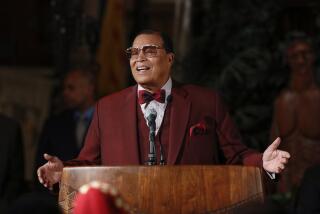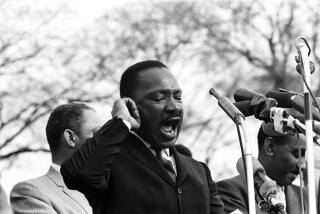Focus on the Family : Farrakhan the Latest Voice in a Chorus Calling for Return to Old-Fashioned Values
WASHINGTON — The rhetoric of morality is rapidly becoming a cornerstone of American public discourse, linking voices that otherwise seem to have little in common.
This week, controversial Nation of Islam leader Louis Farrakhan joined the chorus.
At Monday’s “Million Man March,” Farrakhan spoke of accepting “the responsibility that God has put upon us . . . to be good husbands and fathers and builders of our community.”
His comments echoed similar exhortations from Pope John Paul II, President Clinton, religious broadcaster Pat Roberston and the speakers at mass rallies for men staged by the Promise Keepers Christian organization.
Taken together, said Jean Bethke Elshtain, professor of social and political ethics at the University of Chicago, the rhetoric underscores a national consensus that society is sick and a return to family values is the cure.
“From lots of different places on the political spectrum and lots of positions doctrinally,” said Elshtain, “there’s a tremendous convergence on certain . . . familial themes about love, care, responsibility, being responsible for your children, staying married, husbands being kind and decent to your wife.
“I think all of that’s coming back in a big way. We look around and we see what’s happened when we ignored these things.”
Hilbert Stanley, executive director of the National Black Catholic Congress, said his organization has made strengthening the African American family a priority since 1992. Farrakhan’s message, he said, may prove to be a “call to action” for black Catholics.
“This certainly is an opportunity for us to get off the talk and get on the walk,” Stanley said. “That’s what we want to do.”
For some, Farrakhan’s provocative statements about Jews and Catholics--and whites and Christians in general--push him beyond the pale and negate his moral message.
But even some of Farrakhan’s harshest critics this week praised his call for black men to take responsibility for themselves, their families and their neighborhoods.
Speaking on “The 700 Club” television show Tuesday, Robertson variously called Farrakhan “a demagogue,” “a monger of hate,” an “anti-Semite” and a “racist.”
But Robertson also acknowledged that Farrakhan “is embracing initiatives that we all applaud: law and order, discipline in children, family, unity.”
And at a post-march news conference, Farrakhan took note of the common ground.
“I think the Pope and Pat Robertson are religious men and they have a frame of reference, which is the Bible, Old and New Testaments,” Farrakhan said. “And we have that same frame of reference: the Bible, Old and New Testaments and Koran. And so out of that, which is their frame of reference, they speak. And out of that, which is our frame of reference, we speak.
“If there are similarities in our speaking, it’s because we’re coming from the same frame of reference,” the Nation of Islam leader said.
But the similarities seem to go beyond a common scriptural basis to a shared feeling that society--black and white, Republican and Democrat, Christian and Muslim and Jew--must refocus its moral vision to put genuine family values first.
And Farrakhan’s focus on men fits neatly and his emphasis on fatherhood is little different from the agenda of the men-only rallies of the Promise Keepers, an evangelical Protestant movement that encourages men to be more involved with their families and their church.
Fatherhood, said Elshtain, is an “ethical vocation” too long ignored to the detriment of society’s most vulnerable members--its children. “I think this is a message that is . . . reminding us of the responsibility of fathers and of the importance of their care to their children.”
During his recent visit to the United States, Pope John Paul II told about 70,000 Catholics gathered for Mass in New York that “fathers . . . must accept their full share of responsibility for the lives and upbringing of their children.”
“Society must strongly reaffirm the right of the child to grow up in a family in which, as far as possible, both parents are present,” the Pope said.
The Pope receives universal praise for such statements. Yet despite John Paul’s personal popularity, his church’s teachings are selectively followed by America’s nearly 60 million Catholics. A national poll taken just before the Pope’s arrival showed overwhelming acceptance--by 85% of those polled--of divorce and remarriage for Catholics without church approval.
The same selective hearing appeared true for black Americans as they listened to Louis Farrakhan. Blacks may respect him, but that does not translate to allegiance to his religious agenda.
A Washington Post survey of black men at the march revealed that 87% had a favorable impression of Farrakhan, but just 5% of the marchers said they are members of the Nation of Islam. Fourteen percent had no religious affiliation at all.
Moreover, while Farrakhan called the march a “holy day of atonement,” most of those interviewed did not regard their participation as a religious statement. For many, atonement meant improving their relationships with family and fellow black men. God was not part of the equation.
Charles Bey, 42, a dietary supervisor of a Philadelphia-area mental health center, already is helping the homeless in his community find housing and jobs. For him, the theme of the march meant trying to do more.
“I cannot honestly say that I’m doing the very best I can,” said Bey, a member of the Moorish Science Temple of America, a black Islamic sect. “I came for more of a renewal of commitment to my community, to my people. . . . I’m trying to do the right thing. I want to do more.”
From the steps of the U.S. Capitol, however, Farrakhan told the hundreds of thousands of black men assembled before him that righting the African American community’s moral compass requires more than just coming together.
He spoke of sin and humbling oneself before God.
“Now, brothers,” Farrakhan said toward the end of his two-hour speech, “moral and spiritual renewal is a necessity.”
More to Read
Sign up for Essential California
The most important California stories and recommendations in your inbox every morning.
You may occasionally receive promotional content from the Los Angeles Times.










